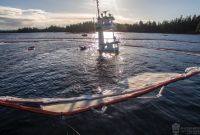Support strong Canadian climate journalism for 2025
Sunken sailboats, derelict ships and rusted out bulk carriers: The abandoned stuff of Maritime pursuits left to sully the country's coastline seem as inescapably tied to our oceans as tides and sand.
But Canada's transport minister is taking aim at the seafaring wreckage he says poses an environmental and navigation risk.
Marc Garneau said Tuesday Ottawa is set to announce a new program that will support the removal of abandoned boats posing a hazard in Canadian waters.
"Sometimes it's very clearly a navigation hazard," he told a business audience gathered in a downtown Halifax hotel ballroom. "And sometimes it's an environmental hazard because quite often they sink and they have residual fuel or other contaminants left in them and at some point in the future we live with the consequences."
About 600 boats have been ditched on Canada's coasts.
Garneau said the federal government will work with the provinces and some funding will be available to address the "backlog" of abandoned vessels.
The federal government's $1.5-billion Oceans Protection Plan will ensure liability will remain with the owner of a boat from the moment they purchase it until it's disposed of properly, he said.
"It's one thing for something to sink in an act-of-God storm," Garneau told reporters. "It's another thing to deliberately abandon your vessel and to walk away from it and leave the mess for somebody else to clean up. That's not going to be tolerated."
While most vessels end up sold for scrap or retired to a junkyard, some are abandoned in marinas, docked at a wharf or run aground and left to rust away at sea.
It took four years for the MV Miner to be removed from the coast of Cape Breton. The 12,000-tonne, 223-metre bulk carrier was being towed from Montreal to Turkey in September 2011 to be scrapped when a tow line broke, causing the vessel to run aground on an environmentally protected stretch of coast near Main-a-Dieu, N.S.
In Shelburne, N.S., the rusted remains of the once notorious MV Farley Mowat wasted away for years, despite multiple court-imposed deadlines to remove the ship.
The flat-black ship was part of a small fleet commanded by Canadian environmental crusader Paul Watson.
On April 12, 2008, an RCMP tactical squad stormed the ship and accused its captain and chief officer of violating Canadian law by getting too close to the annual seal hunt in the Gulf of St. Lawrence.
The former Norwegian fisheries research vessel was sold for $5,000 in 2009 and was supposed to be refitted, but that never happened. It later showed up in Lunenburg in 2010 and then in Shelburne harbour in September 2014.
On June 25, 2015, the ship sank in its berth, forcing the Canadian Coast Guard to mount a $500,000 cleanup effort that saw the vessel refloated. More than 2,000 litres of pollutants were eventually removed from the hull.
"Across Canada I've been told there are more than 600," Garneau said. "There are more on the West Coast than the East Coast and they vary from small pleasure craft to some fairly large-sized boats like the Farley Mowat and even larger."





Comments